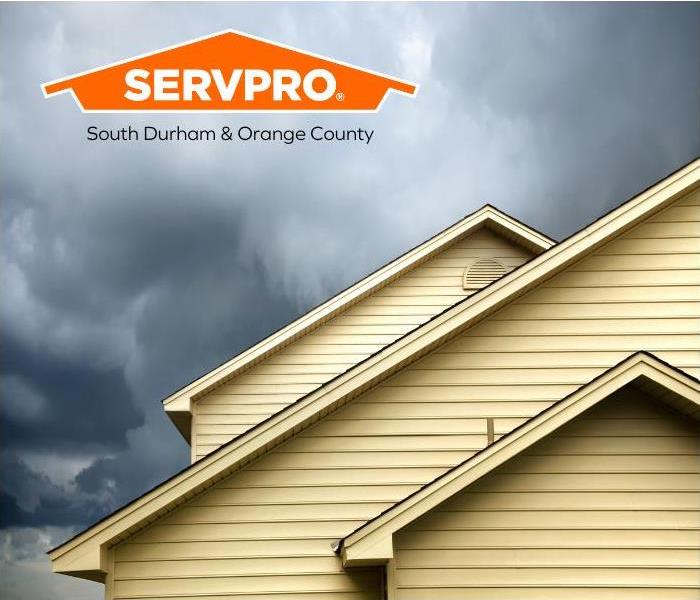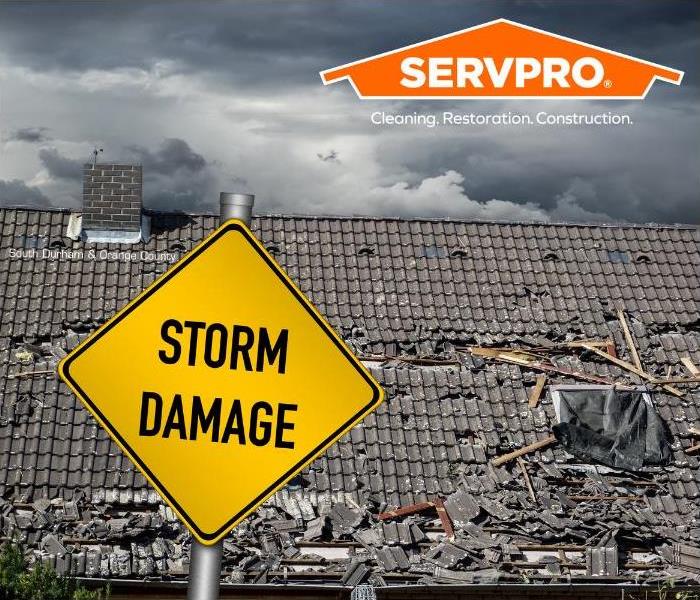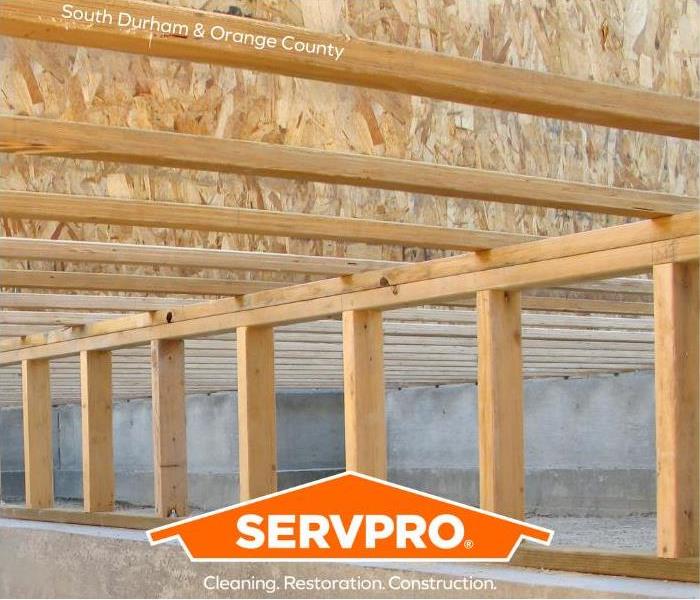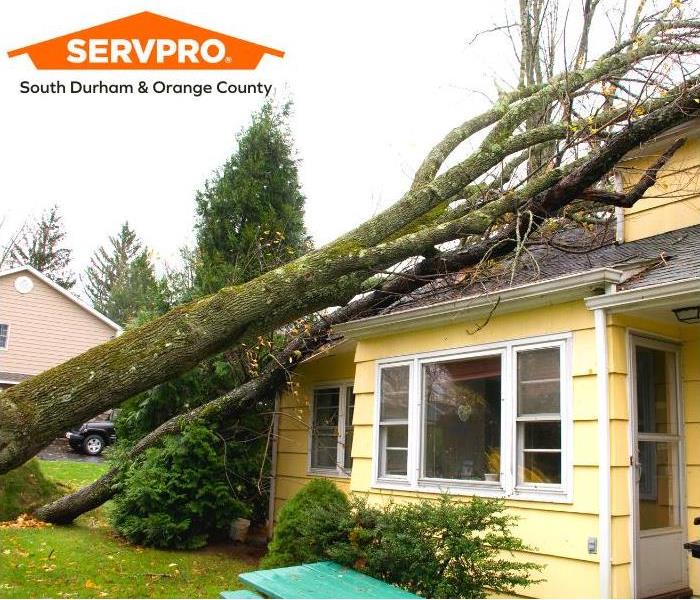Recent Storm Damage Posts
Do You Have Storm Coverage?
6/10/2022 (Permalink)
An insurance agent reached out to me to call a customer of his that had significant water damage in his flooded basement. The agent knew the customer needed our services, but he didn’t know if the damage would be covered. The determining factor would rest on how the adjuster classified the cause of loss.
When I called the customer, I was told by them that there was over two inches of standing water covering the1500sf finished basement. The flooring was laminate and there were multiple rooms of furniture and other contents that were affected. Their assessment of how the water had gained access to the home was due the heavy torrential rains that had occurred the previous night. Based on this information and that of the agent, it was clear that there would likely be no insurance coverage for this massive loss. This is because homeowners’ insurance does not cover flood water damage. A separate flood insurance policy would have provided the much-needed coverage to mitigate and reconstruct the home.
It is advisable that all homeowners have an annual insurance policy review and discuss their coverages. Although SERVPRO can help with any mitigation situation, it is sad when good people have a bad situation in which they are unable to afford the cost to rectify the situation. In conclusion, it always a wise practice to have both a homeowner’s and a flood policy. This will assure that SERVPRO will be able to make it "Like it never even happened.”
Storm Proof Your Roof
5/13/2022 (Permalink)
June 1st marks the beginning of hurricane season. Each year hurricanes and tropical storms cause millions of dollars of damage to commercial and residential properties. One the largest building systems damaged by high winds and water are roofing systems. As the highest point with multiple parts, roofs take a vast beating from torrential rain and high winds. Roofing systems are also constantly exposed to the seasonal elements of blaring heat from the sun and the extreme cold of winter along with the snow and ice that accompanies it. Although no preventative practices can assure that no damage will occur to your building or home; storm proofing your roof can save you thousands of dollars in costly repairs. Here are several practices that should be employed to protect and storm proof your roof.
- Routine maintenance- The roof needs to be checked regularly for loose or damaged shingles, flashing or vents or pipe collars. Additionally, metal roofing and flat roofing systems should be professionally maintained.
- Check your attic for water spots and mold which would indicate that there is a leak. Also check for wood rot on rafters. If any of these things are found, immediate maintenance to correct the issue is essential to prevent more costly damage and the possible denial of an insurance claim after a storm.
- Insurance review- Review your insurance policy to be apprised of your coverage and deductible limit.
- Clean gutters- If the roof has gutters that do not have gutter caps that prevent clogging from debris, routine gutter cleaning is necessary to prevent damage to fascia boards caused by water overflowing the gutter.
- Cut overhanging tree limbs and dead trees that could fall on the roof. A fallen tree limb can puncture a roof causing massive damage. This is also true for a fallen tree that can break rafters and potentially result in the injury or death of occupants. Having dangerous trees surrounding your business or home removed is one of the most effective means of storm proofing your roof.
How to Prevent Crawlspace Flooding
4/25/2022 (Permalink)
Crawlspace flooding can cause serious damage to your home and understanding how to prevent it is key to avoiding the costly repairs associated with type of water damage. For most homeowners the crawlspace is not an area of the home that often visited or even thought about. The common assertion is that the crawlspace is a dark cobweb filled cavernous, and creepy place that is to be avoided or left for a repairman to go inside for the sole purpose of fixing piping or an air handler.
However, the crawlspace requires attention on a more regular basis to assure that it is dry in order to protect electrical components such as the air handler unit of the heating and ac unit, prevent mold growth and preserve the structural integrity of the foundation.
During periods of heavy rains crawlspace flooding can occur. Several reasons for this are:
- Clogged gutters. If the gutter system on the home or building the large volume of water in an intense rainstorm will cause the water to overflow and water will collect along the foundation and lead to crawlspace flooding. To prevent this, have gutter guards installed or clean the gutters on a regular basis.
- Improper landscaping: If the landscaping of the home fails to divert water away from the structure, flooding is likely to occur. A great solution is to have a landscaping company install a French drain system and make sure that the lot is properly graded,
- Have a home inspection to check pipes that run along the floor joists for leaks. If any are found, have them immediately repaired.
- Install a sump pump: A sump pump is a valuable tool that will pump water out the crawlspace, upon detection, keeping your crawlspace flood free.
If you have a storm flooded crawlspace call SERVPRO of Orange County at (919)245-0788 for extraction and drying. We make it like it never even happened.
Tips to Protect Your Orange County North Carolina Business from Storm Damage
3/28/2022 (Permalink)
Severe Storms in Chapel Hill, Carrboro, Hillsborough, Cedar Grove, or Hurdle Mills can damage brick and mortar businesses with driving winds, lightning strikes, and water damage from flooding and wind-driven rain. To protect your business as much as possible preventative measures must be taken, here are a few tips that can be implemented to help safeguard your business from the impact of severe water, wind, and lightning damage.
- Have your roof inspected prior to storm events. Having roof inspection done can uncover areas that may need maintenance. Repairs done prior to the storm can minimize water damage caused by heavy downpours.
- Check flashing. Any areas where the roof meets a wall or chimney will have metal flashing that over time may become loose. This provides a major weakness and unless repaired can lead to costly water damage.
- Inspect skylights. Make sure skylights are properly secured and sealed to prevent costly damage,
- Install a lightning system. A lightning system will protect your sensitive electronic equipment from damage.
- Inspect Air Conditioning Units
- Remove exterior items that can be blown by heavy wind and cause damage or be damaged.
- Install a back-up generator: In the event of a power outage a back-up generator can bridge the gap and keep you up and running.
- Board windows if necessary. In the event of a tropical storm or hurricane boarding windows is a necessity.
- Make sure you have the correct insurance. Meet with your insurance agent and have your business policies reviewed to make sure your business is properly insured.
It is impossible to prevent all storm damage, and should your Orange County, North Carolina business experiences water, wind, or fire damage contact SERVPRO of Orange County at 919-245-0788. We make it "Like it never even happened."
Storm Safety True or False
2/25/2022 (Permalink)
North Carolina weather is known for its thunderstorms during the hot summer months of summer. Thunderstorms are not to be taken lightly because of the numerous perils that accompany them such as flooding, high winds, and lightning sticks which can result in injury or death. To keep you and your family safe it is imperative that you know the facts versus falsehoods. Here is a quiz to test your knowledge.
- True or False: You should unplug electronics well before the storm arrives.
- True or False: Rubber soled shoes are adequate protection in the event you are struck by lightning.
- True or False: You should go inside a secure structure during a storm.
- True or False: It is okay to stand in the window or by the door during a severe storm.
- True or False: You should find the highest hill, open field, beach, or boat during a storm.
- True or False: You should avoid washing your hands, washing dishes, or showering during a storm.
- True or False: You should not lie on a concrete floor or lean against a concrete wall during a thunderstorm.
- True or False: You should wait 30 minutes after the last clap of lightning before going outside.
- True or False: You should shutter windows and secure doors to protect yourself, loved ones and the home.
- True or False: It is a best practice to remove dead or rotting trees that could fall and cause injury during a severe thunderstorm?
Should you experience water or fire damage due to a severe weather event contact SERVPRO of Orange County (919) 245-0788
Answers: 1) True 2) False 3) True 4) False 5) False 6) True 7) True 8) True 9) True 10) True
An Important Fact About Flood Water and Your Home
1/14/2022 (Permalink)
North Carolina weather can bring flash flood alerts during any season of the year. These severe weather events can be the result of a major thunderstorm, microburst, tornado, or hurricane. Flood or ground water affecting your home can be dramatically different from a pipe or water heater that ruptures.
Flood or ground water is classified as a Category 3 water loss, meaning it is grossly contaminated. Water is a solvent, and it picks up anything soluble that it encounters. Contaminates in flood water can include germs, microorganisms, bacteria, toxins, fecal matter, chemicals from improperly discarded medicine, oil, or gasoline. The hazardous nature of flood or ground water makes it extremely hazardous. As a result of these hazards, flood water is required by the water remediation standard know as the IICRC S500 to remove and discard all porous materials impacted by Category 3 water intrusions. This will include drywall, insulation, carpets, padding, impacted furniture and other contents.
Clean water sources such as pipe or water heater that is caught within a few hours can be properly dried without the removal and disposal of impacted structural items or contents.
Flood or ground water is costly and is not covered by standard homeowners’ policies. A covered claim would require a separate flood policy. Most homeowner” don’t purchase one unless they live in a flood plain. Although the flood policies are expensive it might be something you want to consider.
If your home or business has been impacted by flood or ground water contact the water specialists at SERVPRO of Orange County to mitigate, remediate and reconstruct your home or business. Call us at (919) 596-1242. We Make It "Like it never even happened."






 24/7 Emergency Service
24/7 Emergency Service





